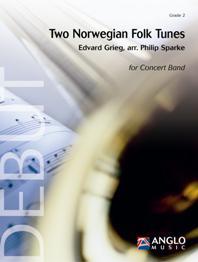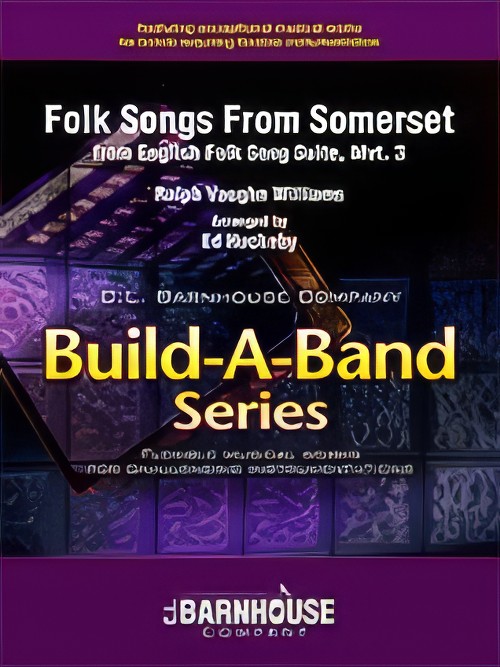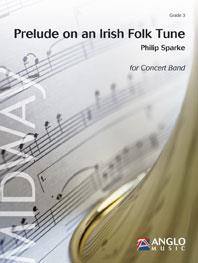Results
-
 £74.99
£74.99Two Norwegian Folk Tunes - Edvard Grieg
The melodies, harmonies, moods and rhythms of Norwegian folk songs and dance (even the sounds of Norwegian folk instruments) permeate the music of Edvard Grieg (1843-1907). After studying in Leipzig and Copenhagen he returned to Norway and a chance meeting with Norwegian nationalist Rikard Nordraak ignited his interest in folk music and laid the foundation for his compositional style. His most famous orchestral works are the Piano Concerto (1868) and the incidental music to Ibsen's play Peer Gynt (1875). He wrote many collections of folk music for piano and these two tunes come from his 25 Norwegian Folk Songs and Dances, op. 17.
Estimated dispatch 7-14 working days
-
 £72.99
£72.99Two Norwegian Folk Tunes (Concert Band - Score and Parts) - Grieg, Edvard - Sparke, Philip
The melodies, harmonies, moods and rhythms of Norwegian folk songs and dance (even the sounds of Norwegian folk instruments) permeate the music of Edvard Grieg (1843-1907). After studying in Leipzig and Copenhagen he returned to Norway and a chance meeting with Norwegian nationalist Rikard Nordraak ignited his interest in folk music and laid the foundation for his compositional style. His most famous orchestral works are the Piano Concerto (1868) and the incidental music to Ibsen's play Peer Gynt (1875). He wrote many collections of folk music for piano and these two tunes come from his 25 Norwegian Folk Songs and Dances, Op.17.Duration: 2:10
Estimated dispatch 7-14 working days
-
 £159.00
£159.00Greek Folk Song Suite No. 2 - Franco Cesarini
After the great success of the Greek Folk Song Suite that has lasted for over twenty years, Franco Cesarini once again ventures into the long and rich tradition of Greek folk music. In his Greek Folk Song Suite No. 2, the three movements that form the piece are named after the three dances reworked by the composer.The first movement, Samiotissa is a kalamatianos, whose most distinctive feature is the irregular 7/8-time signature. It is a festive dance, today considered the Greek national dance, which has roots dating back to antiquity.The second movement, Kato sto jalo is a zeibekiko, a slow-paced dance performed by only one man at a time which was apparently originated among the warriors of Ancient Anatolia.The third and last movement, Chasaposerviko, is the fast part of the hasapiko dance and is characterized by its more extensive form.A new journey into the Greek folk tradition that will delight both performers and audience.
Estimated dispatch 7-14 working days
-
 £91.99
£91.99Prelude on an Irish Folk Tune - Philip Sparke
The Irish folk tune, which appears towards the end of the piece, is Slane, a hymn tune version of the much older folk melody The Banks of the Bann. In Prelude on an Irish Folk Tune, fragments of the folk tune hint at what is to come later in the piece, but another folk-like tune is predominant. This later acts as a descant to Slane when it finally appears. Add a little Sparke sparkle to any concert with this lovely interlude.
Estimated dispatch 7-14 working days
-
 £60.00
£60.00Folk Songs from Somerset (from English Folk Song Suite) (Flexible Ensemble - Score and Parts) - Vaughan Williams, Ralph - Huckeby, Ed
Folk Songs From Somerset, the third movement from Ralph Vaughan Williams' "English Folk Song Suite" is a classic march incorporating four traditional folk songs: "Blow Away The Morning Dew," "High Germany," "The Tree So High" and "John Barley's Corn." Using both 2/4 and 6/8 meters, Vaughan Williams has created a unique educational opportunity for ensembles to contrast duple and compound meter. Creatively adapted for the Build-A-Band series by master composer/arranger, Ed Huckeby, this masterful work is now available for ensembles with unusual or limited instrumentation. Your students and audiences will love this English band classic!Duration: 4.00
Estimated dispatch 7-14 working days
-
 £91.99
£91.99Prelude on an Irish Folk Tune (Concert Band - Score and Parts) - Sparke, Philip
The Irish folk tune, which appears towards the end of the piece, is Slane, a hymn tune version of the much older folk melody The Banks of the Bann. In Prelude on an Irish Folk Tune, fragments of the folk tune hint at what is to come later in the piece, but another folk-like tune is predominant. This later acts as a descant to Slane when it finally appears. Add a little Sparke sparkle to any concert with this lovely interlude.Duration: 4:00
Estimated dispatch 7-14 working days
-
£164.99
Reflections on an Old Japanese Folk Song (Concert Band - Score and Parts) - Sparke, Philip
Reflections on an Old Japanese Folk Song is based on the tune Suiryo-Bushi, which comes from the shamisen tradition and opens with two contrasting statements of the melody followed by several variations each in an own style based upon the same tune, or sometimes only fragments of it. In one of the variants, the pentatonic scale is used. The final section is in the form of a scherzo, which eventually forms the accompaniment to a final presentation of the folk tune. Reflections on an Old Japanese Folk Song is based on the tune Suiryo-Bushi, which comes from the shamisen tradition and opens with two contrasting statements of the melody followed by several variations each in an own style based upon the same tune, or sometimes only fragments of it. In one of the variants, the pentatonic scale is used. The final section is in the form of a scherzo, which eventually forms the accompaniment to a final presentation of the folk tune.Duration: 8:30
Estimated dispatch 7-14 working days
-
£65.99
Folk Songs From Somerset - Ralph Vaughan Williams
"Folk Songs From Somerset," the third movement from Ralph Vaughan Williams' "English Folk Song Suite" is a classic march incorporating four traditional folk songs: "Blow Away The Morning Dew," "High Germany," "The Tree So High" and "John Barley's Corn." Using both 2/4 and 6/8 meters, Vaughan Williams has created a unique educational opportunity for ensembles to contrast duple and compound meter. Creatively adapted for the Build-A-Band series by master composer/arranger, Ed Huckeby, this masterful work is now available for ensembles with unusual or limited instrumentation. Your students and audiences will love this English band classic!
Estimated dispatch 7-14 working days
-
 £228.70
£228.70Reflections - Suite on a Norwegian Folk Tune - John Brakstad
The suite is constructed around a Norwegian folk tune. The melody is called "Dark Forebodings", and the words of the song revolve around thoughts and reflections on a future that can take unexpected, insecure, or perhaps dramatic and tragic turns.This is essentially a sad song with a beautiful melody. The folk tune itself is presented in the 2nd movement. In the 1st movement, the folk tune is joined with fleeting themes that indicate the unexpected; as if the music sometimesis confused as to which way to go. There are constant changes in atmosphere and feeling, from the harsh and dissonant, to the harmonious and melodic. The 3rd movement presents a more lively variant of thefolk tune, showing optimism andhappiness, even though the "halting" character of the rhythm underscores the unpredictable. The title "Reflections", therefore, refers to thoughts we can have about life. To the Conductor:The 2nd movement has an alternativeending which is may be used if the movement is played as an independent lyrical piece in a concert.It is advisable to begin first rehersal with the 2nd movement so that the main theme is known, before beginning on the 1st movement with itsmore semi-tonal parts. Intervals and intonation can provide much of the challenge in this movement.The 3rd movement can be more technically challenging, but there is considerable leeway in the tempo marking! It is important to maintain theenergy and intensity of the music through the whole movement.
Estimated dispatch 7-14 working days
-
 £154.99
£154.99Greek Folk Song Suite - Franco Cesarini
Greek folk music is characterised by the sound of the 'buzuki' which is often used in combination with the clarinet, the mandolin, the violin and various types of tambourines. In Greek Folk Song Suite, Franco Cesarini has elaborated on three songs belonging to this most ancient tradition. The first, O Haralambis, is in 7/8 time, a characteristic of a popular folk dance called kalamatianos. Originally, the song O Haralambis was sung to 'tease' during weddings with the text of the song refering to a young man who refuses to marry. The second movement, Stu Psiloriti, refers to an ancient song from the island of Crete. The third movement of the suite is based on the songVasilikos tha gino and is characterised by the sirtaki, probably the most popular Greek dance outside of Greece. This is Greek passion portrayed by a concert band!
Estimated dispatch 7-14 working days
